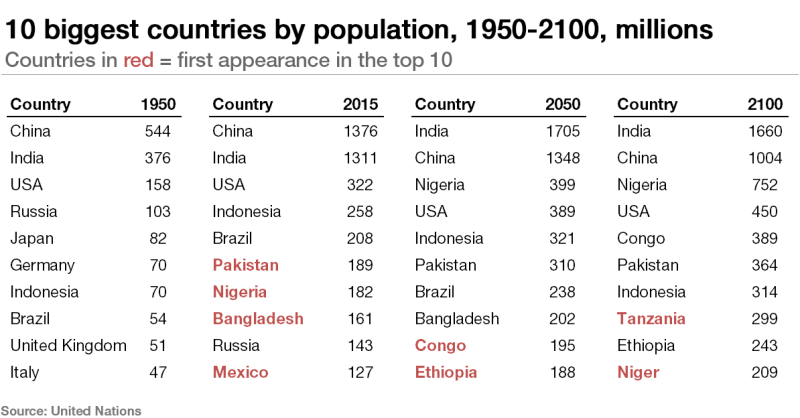Category:Human Population: Difference between revisions
Siterunner (talk | contribs) No edit summary |
Siterunner (talk | contribs) No edit summary |
||
| Line 7: | Line 7: | ||
'''By 2050, this number could rise to more than 9 billion'''... | '''By 2050, this number could rise to more than 9 billion'''... | ||
http://www.prb.org/Publications/Lesson-Plans/HumanPopulation/PopulationGrowth.aspx | * http://www.prb.org/Publications/Lesson-Plans/HumanPopulation/PopulationGrowth.aspx | ||
* https://en.wikipedia.org/wiki/Population_growth | |||
https://en.wikipedia.org/wiki/Population_growth | |||
Global human population growth amounts to around 75 million annually, or 1.1% per year. The global population has grown from 1 billion in 1800 to 7 billion in 2012. It is expected to keep growing, where estimates have put the total population at 8.4 billion by mid-2030, and '''9.6 billion by mid-2050'''. | Global human population growth amounts to around 75 million annually, or 1.1% per year. The global population has grown from 1 billion in 1800 to 7 billion in 2012. It is expected to keep growing, where estimates have put the total population at 8.4 billion by mid-2030, and '''9.6 billion by mid-2050'''. | ||
Revision as of 19:22, 18 April 2019
<addthis />
For the last 50 years, world population multiplied more rapidly than ever before, and more rapidly than it is projected to grow in the future. In 1950, the world had 2.5 billion people; and in 2005, the world had 6.5 billion people.
By 2050, this number could rise to more than 9 billion...
Global human population growth amounts to around 75 million annually, or 1.1% per year. The global population has grown from 1 billion in 1800 to 7 billion in 2012. It is expected to keep growing, where estimates have put the total population at 8.4 billion by mid-2030, and 9.6 billion by mid-2050.
○ ○ ○ ○ ○ ○ ○ ○ ○ ○ ○ ○ ○ ○ ○
World Population Data
The world population will reach approximately 9.9 billion in 2050, up 33 percent from an estimated 7.4 billion now, according to projections included in the 2016 World Population Data Sheet from the Population Reference Bureau.
The world population would hit the 10 billion mark in 2053 if the assumptions underlying PRB's 2050 projections are applied to subsequent years.
"Despite declines in fertility rates around the world, we expect population gains to remain strong enough to take us toward a global population of 10 billion," said Jeffrey Jordan, president and CEO of PRB. "Significant regional differences remain, though. For example very low birth rates in Europe will mean population declines there while Africa's population is expected to double."
PRB's projections show Africa's population will reach 2.5 billion by 2050, while the number of people in the Americas will rise by only 223 million to 1.2 billion. Asia will gain about 900 million to 5.3 billion, while Europe registers a decline from 740 million to 728 million. Oceania (which includes Australia and New Zealand) would rise from 40 million to 66 million.
○
○ ○
○ ○ ○ ○
○ ○ ○ ○ ○ ○ ○ ○
○ ○ ○ ○ ○ ○ ○ ○ ○ ○ ○ ○ ○ ○ ○ ○
○ ○ ○ ○ ○ ○ ○ ○ ○ ○ ○ ○ ○ ○ ○ ○ ○ ○ ○ ○ ○ ○ ○ ○ ○ ○ ○ ○ ○ ○ ○ ○
○ ○ ○ ○ ○ ○ ○ ○ ○ ○ ○ ○ ○ ○ ○ ○ ○ ○ ○ ○ ○ ○ ○ ○ ○ ○ ○ ○ ○ ○ ○ ○ ○ ○ ○ ○ ○ ○ ○ ○ ○ ○ ○ ○ ○ ○ ○ ○ ○ ○ ○ ○ ○ ○ ○ ○ ○ ○ ○ ○ ○ ○ ○ ○
Media in category "Human Population"
The following 2 files are in this category, out of 2 total.
- Population-change-1950-2100.png 800 × 418; 95 KB


